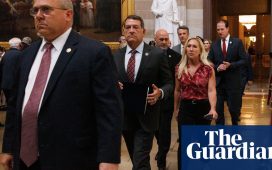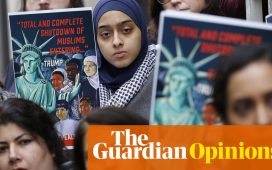When things are going bad for Donald Trump, immigrant advocates like Marielena Hincapié brace themselves for what could come next.
A constant in his chaotic presidency is how immigration is used as a cudgel, through rhetoric or policy, when nothing else seems to be working out.
Take this week. As national Covid-19 cases hit a record high and the president recovered from perhaps his worst-attended rally, he visited the border wall, signed it and suspended certain types of work visas.
“Every time that he’s under attack or he feels he’s been cornered or may be blamed for something, we can expect that he’s going to default to attacking immigrants,” said Hincapié, the executive director of the National Immigration Law Center (NILC), one of the nation’s top immigrant advocacy groups.
Hincapié continued: “Our expectation is that over the next month, as the election gets closer, if the economy continues to be in this downward spiral, if we have another surge in the public health crisis because of the reopening, etc, that’s what we’ll continue to see.”
While bracing for the immediate future, Hincapié is also focused on what could happen in November.
Hincapié has a key role in helping to shape the Democratic party’s agenda in 2020 as a co-chair of the Biden-Sanders Unity Task Force. In her position on the taskforce’s immigration committee, she has had a glimpse into what the future of immigration policy could look like, should Trump lose the 2020 election.
The taskforce includes lawmakers such as the New York representative Alexandria Ocasio-Cortez and the former secretary of state John Kerry. It is a blend of progressives and moderates. Hincapié comes at things from the Bernie Sanders wing of the party.
“It’s been a lot of work,” Hincapié said. “We are three-quarters of the way through and have been making some pretty substantial progress.”
Whoever wins in November will probably still be responding to an ongoing pandemic, a continuing economic crisis and the effects of uprisings against the country’s systemic racism.

Hincapié, who moved to the US from Colombia when she was three years old, said all these issues were colliding with the immigrant experience under the Trump administration. “We have been experiencing war, nothing short of what feels like an all-out war by the Trump administration, frankly, since he started running for office,” said Hincapié.
Even in the pandemic, the White House has pushed through policies which cater to the most extreme anti-immigrant positions in the Republican party. Now, the refugee system is effectively on pause, the asylum system has ground to a halt and hundreds of thousands of family members of US residents and temporary workers have been blocked from entry because of recent bans on several visa categories.
“Trump’s rhetoric is almost exclusively about undocumented immigrants – he calls undocumented immigrants everything from murderers and rapists to gang members, etc,” said Hincapié. “But in fact, the policy changes he has put in place, almost all are chipping away at the legal immigration system.”
Noting projections that the coronavirus crisis could last into next year, Hincapié said the 2020 presidential election carried extra weight for immigrants being denied benefits or who have worked through the pandemic because they are essential workers. “For immigrants, this election is consequential. It’s truly a matter of life and death for people,” Hincapié said.
The pandemic has exposed existing inequalities for immigrants. One of the most glaring examples is the exclusion of undocumented immigrants – and in the case of stimulus checks, their US citizen spouses – from economic relief. NILC is pushing for all immigrants to have access to healthcare and testing regardless of their immigration and economic status.
“At all levels, we’ve seen how immigrants have been excluded from the federal relief packages and at the same time the pandemic is showing how absolutely dependent we are on these immigrants who are carrying out the essential roles,” said Hincapié.
Biden has committed to creating a pathway to citizenship for the country’s 11 million undocumented immigrants – something a majority of Americans have long said they support but has failed to become law in Congress. Hincapié said she was confident a Biden administration would prioritize this.
She noted Biden’s comments praising essential workers who are immigrants and said that this attention would be important as the pandemic continues. Hincapié said: “Biden, particularly when it comes to immigrants, would be providing a very different vision for a country in which immigrants are seen as part of our country and part of our strength and part of our diversity.”






